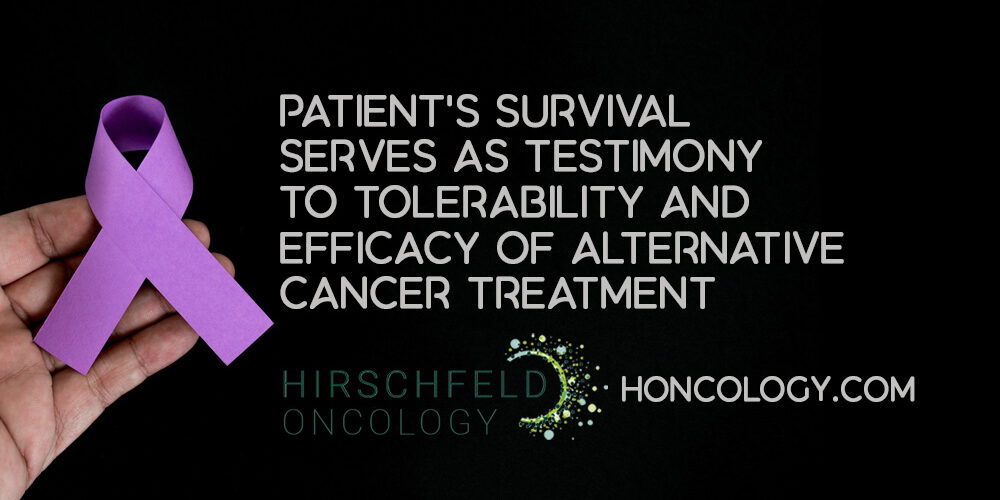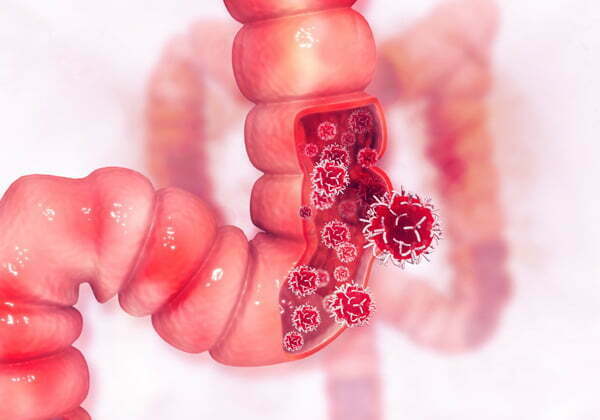Getting ready for your first chemotherapy session can feel overwhelming, but a little preparation goes a long way. Think of it less as a huge project and more as a series of small, manageable steps to set yourself up for comfort and control. It's about organizing the medical details, getting your home ready, and, most importantly, lining up the support you'll need.
Taking the time to plan now can truly make a difference in how you experience the entire process.
Your Roadmap for Chemotherapy Preparation
Stepping into chemotherapy treatment for the first time often feels like being handed a complex map with no clear starting point. My goal here is to be your guide, breaking down the process with real-world advice so you can feel more prepared and less anxious. We'll cover everything from what happens in your first oncology visits to practical tips for making your home a comfortable recovery space.
It’s important to remember you're not going through this alone. Chemotherapy is a cornerstone of cancer treatment globally. Back in 2018, an estimated 9.8 million new cancer patients started chemotherapy, and that number is expected to jump by more than 50% by 2040. You can read more about the global demand for chemotherapy treatment30193-6/fulltext) to understand the broader context.
What You'll Find in This Guide
This is your practical playbook. We'll walk through the essentials of getting organized so you can pour your energy into your health, not into the stress of figuring things out on the fly.
- Working With Your Medical Team: We’ll cover the key questions to ask so you can be an active and informed partner in your own care.
- Creating a Comfortable Home: You'll find simple, effective tips for setting up a recovery-friendly space to help with common side effects like fatigue and nausea.
- Nutrition and Hydration: I'll share straightforward strategies for staying nourished and hydrated—two things that are absolutely vital for keeping up your strength.
- Handling the Logistics: We’ll look at how to manage work, finances, and getting to and from appointments to minimize outside stress.
- Emotional and Mental Wellness: We’ll explore how to build a strong support system and find resources to take care of your mental health along the way.
Don’t look at this as just another overwhelming to-do list. Instead, see it as a series of small actions that put you back in the driver's seat. Each step, no matter how minor it seems, helps replace that feeling of uncertainty with a sense of readiness and confidence.
Before we dive into the details, here’s a quick-glance checklist of the main areas we'll be covering.
Essential Chemotherapy Preparation Checklist
This table provides a high-level overview of the key preparation areas. It's a great way to see the big picture before we get into the specifics of each step.
Think of this checklist as your starting point. As you read through the guide, you’ll be able to fill in the details and create a plan that works perfectly for you.
Partnering with Your Oncology Team
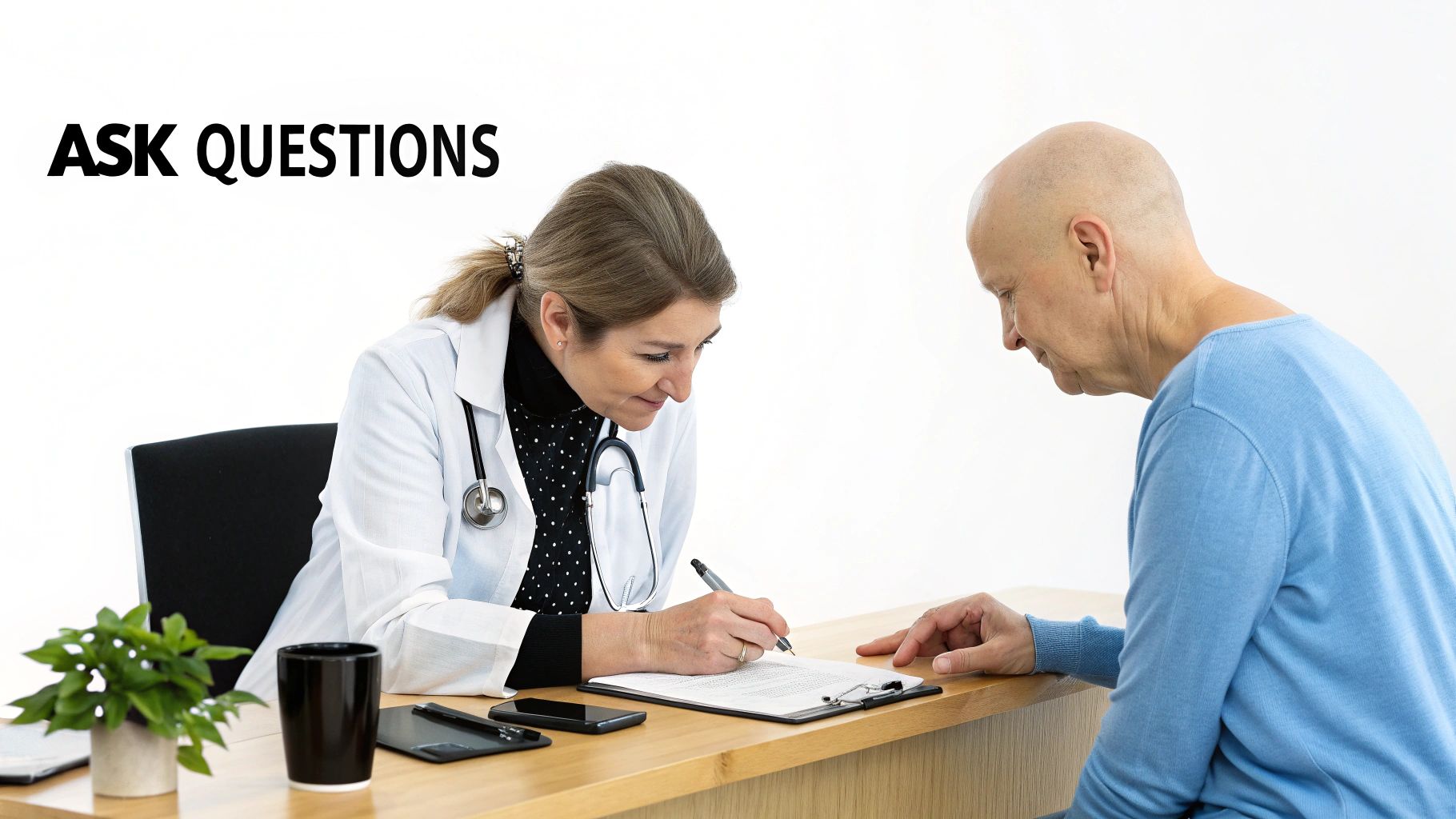
Before your first infusion day ever arrives, the real work of preparing for chemotherapy begins. It all starts with forging a strong relationship with your oncology team. Think of this as more than just a doctor-patient dynamic; it's a true partnership that empowers you to be an active participant in your own care.
Those first few appointments can feel like a whirlwind of information. You'll likely have blood drawn to check everything from your kidney function to your white blood cell counts, and you might get baseline CT or PET scans. These aren't just routine procedures. This is the critical data your oncologist needs to craft a treatment plan that’s right for you.
These initial meetings are all about setting the stage for open, honest communication. Your doctors and nurses are the experts on cancer, but you are the world’s leading expert on your own body.
Navigating Pre-Chemo Appointments
Your pre-chemo consultation is a big one. This is where your oncologist will walk you through the specifics of your drug regimen, explain your treatment schedule (or "cycle"), and clearly define the goals of the therapy. You’ll also be asked to review and sign consent forms—legal documents that detail the potential risks and benefits.
Take your time with these forms. Seriously. If you see a medical term or a side effect you don't understand, ask for a plain-English explanation. Understanding what you're agreeing to is a fundamental part of taking control of your treatment.
This is also the perfect time to get the clinic's communication rules straight. Who do you call with a question that isn't an emergency? Is there a specific number for after-hours problems? Figuring this out now saves you a lot of stress down the road.
Your oncology team genuinely wants you to ask questions. There's no such thing as a "silly" or "unimportant" question when your health is on the line. Jotting them down beforehand helps ensure you don’t forget anything in the moment.
Essential Questions for Your Medical Team
One of the best things you can do for yourself is to walk into your appointments with a prepared list of questions. It helps you stay focused and ensures you leave with the clarity and confidence you need.
It's also a great idea to bring a notebook or a trusted friend to help take notes. It can be incredibly hard to process and remember everything when you're feeling overwhelmed.
Here are a few key questions to get your list started:
- About Your Treatment Plan: What are the names of the chemotherapy drugs I’ll receive, and why did you choose this specific combination for me? How will I get the chemo (IV, pills?), and how long will each infusion session take?
- Logistics and Scheduling: What does my treatment cycle look like? How many cycles are we planning for right now?
- Managing Side Effects: What are the most common side effects people experience with this regimen? Which symptoms should I call about immediately, and which ones can I manage at home?
- Emergency Contacts: Who is my main point of contact, like a nurse navigator? What’s the best number to call for urgent issues that come up after hours or on a weekend?
Good preparation is a mix of clinical understanding and practical planning, which is essential for managing side effects and improving outcomes. For common cancers like lung, breast, and colorectal, patient education on issues like nausea and fatigue is a major focus for healthcare providers. A 2019 study on preparedness strategies highlights just how important this is.
The more you understand about your specific treatment, the better you can anticipate your needs and make the whole process feel less daunting. For more help, check out our guide on creating effective cancer treatment care plans. Building this collaborative foundation with your team is the most important first step you can take.
Setting Up Your Home for Comfort and Recovery
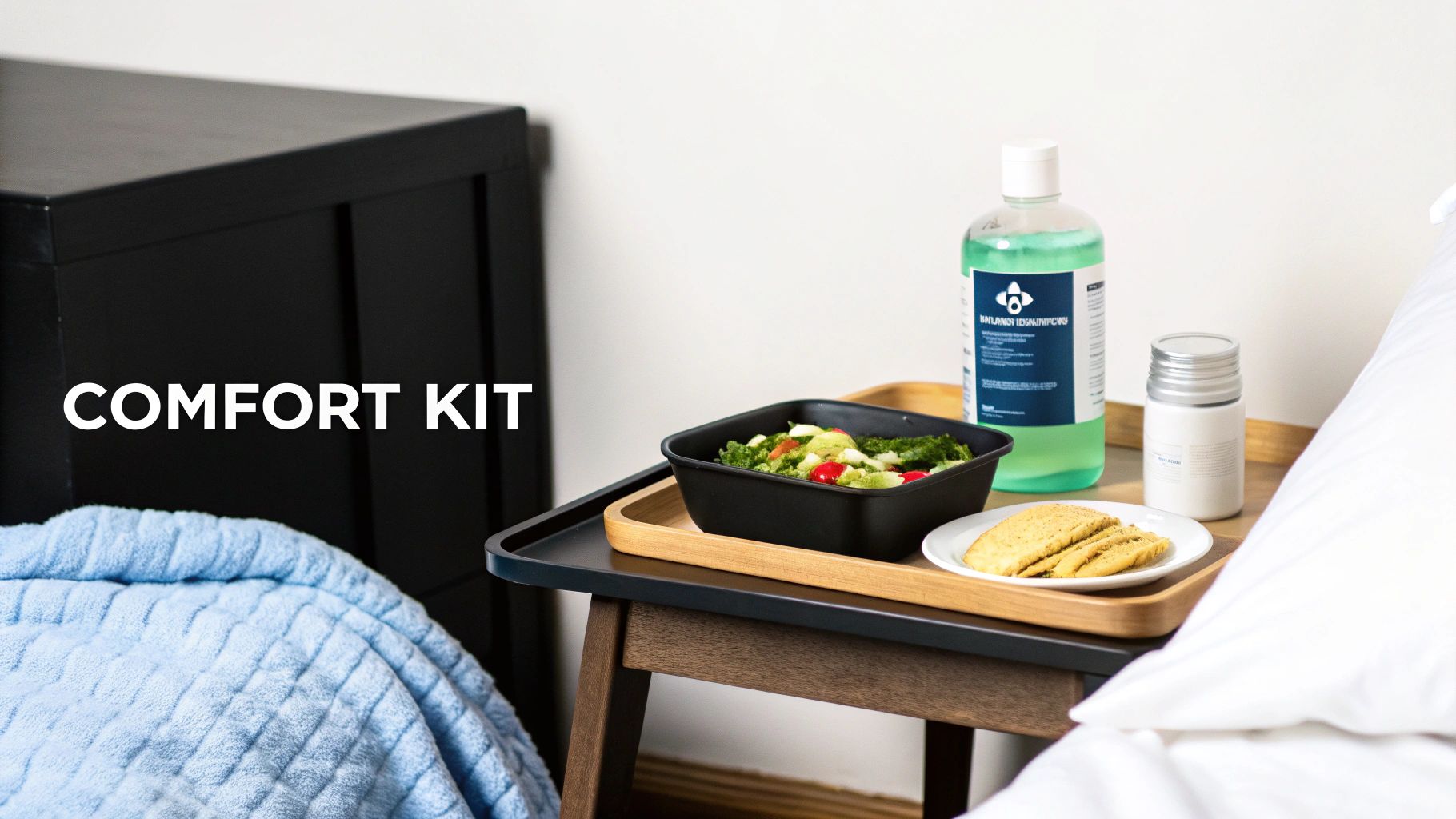
Before your first treatment, one of the most powerful things you can do is turn your home into a true sanctuary for healing. This isn't about a major remodel. It's about small, thoughtful adjustments that make a world of difference when you’re not feeling your best. The whole idea is to create a space that reduces stress and makes managing side effects much easier.
When you anticipate what you'll need before you need it, you save that precious energy for recovery. Think about simple things, like moving your most-used items to a countertop or a lower shelf. Setting up a cozy spot to rest on the main floor can be a lifesaver on days when fatigue hits hard.
Creating Your Recovery Zone
Designate one spot in your home as your primary "recovery zone." This could be a comfy recliner in the living room or a quiet corner in your bedroom. The goal is to have everything you need within arm's reach. This simple act prevents you from having to trek across the house or up and down stairs when you're feeling drained.
What brings you comfort? A soft blanket and a good book? Maybe it's a tablet loaded up with movies and a pair of noise-canceling headphones. Stock this area with all of your essentials.
Make this your go-to spot for rest—a place you genuinely want to be, surrounded by things that soothe and support you. This little bit of planning helps you focus completely on getting well.
Assembling Your Chemotherapy Comfort Kit
I always recommend putting together a "comfort kit"—a collection of practical items to have on hand for common chemo side effects. Having these products ready before you need them eliminates those frantic, last-minute trips to the pharmacy. Think of it as your personal self-care toolkit for treatment.
Here are some essentials I’ve seen patients find incredibly helpful:
- For Nausea: Ginger chews, peppermint tea, and bland snacks like saltine crackers or pretzels can be a huge help in settling an upset stomach.
- For Dry Skin: Chemotherapy can be very drying. Stock up on gentle, unscented lotions and lip balms to keep your skin moisturized and prevent cracking.
- For Mouth Sores: An alcohol-free mouthwash (a simple baking soda and salt water rinse works great) is much gentler on a sensitive mouth. A super-soft toothbrush is also a must.
- For General Comfort: A digital thermometer is non-negotiable for monitoring your temperature, as a fever can be the first sign of an infection. You also can’t go wrong with warm, fuzzy socks and a soft blanket.
This kit isn't just about physical relief. It’s about feeling prepared and in control, which can bring a surprising amount of peace of mind.
Stocking Your Kitchen for Low-Energy Days
During treatment, your appetite and energy levels will almost certainly fluctuate. On a low-energy day, the last thing you'll want to do is figure out how to cook a complicated meal. Stocking your pantry and freezer with simple, nourishing options is one of the kindest things you can do for your future self.
Focus on foods that are easy to prepare and gentle on your digestive system. This is all about having options that require minimal effort but provide maximum comfort and nutrition.
Preparing your kitchen isn't just about food; it's about removing a major source of daily stress. When you're feeling exhausted or nauseous, having a simple, pre-made meal ready to go feels like a huge victory.
Consider stocking up on these types of items:
- Frozen Meals: Prepare and freeze single-serving portions of gentle soups, stews, or pasta dishes ahead of time.
- Pantry Staples: Keep things like instant oatmeal, applesauce, protein drinks, broth, and crackers on hand.
- Hydration Helpers: Make staying hydrated easy. Have electrolyte drinks, herbal teas, and bottled water readily available.
And remember, food safety is critical. Because chemotherapy can weaken your immune system, be extra diligent about washing produce, cooking foods thoroughly, and checking expiration dates. These small steps can make a big difference in preventing illness when you're most vulnerable.
Fueling Your Body Through Treatment
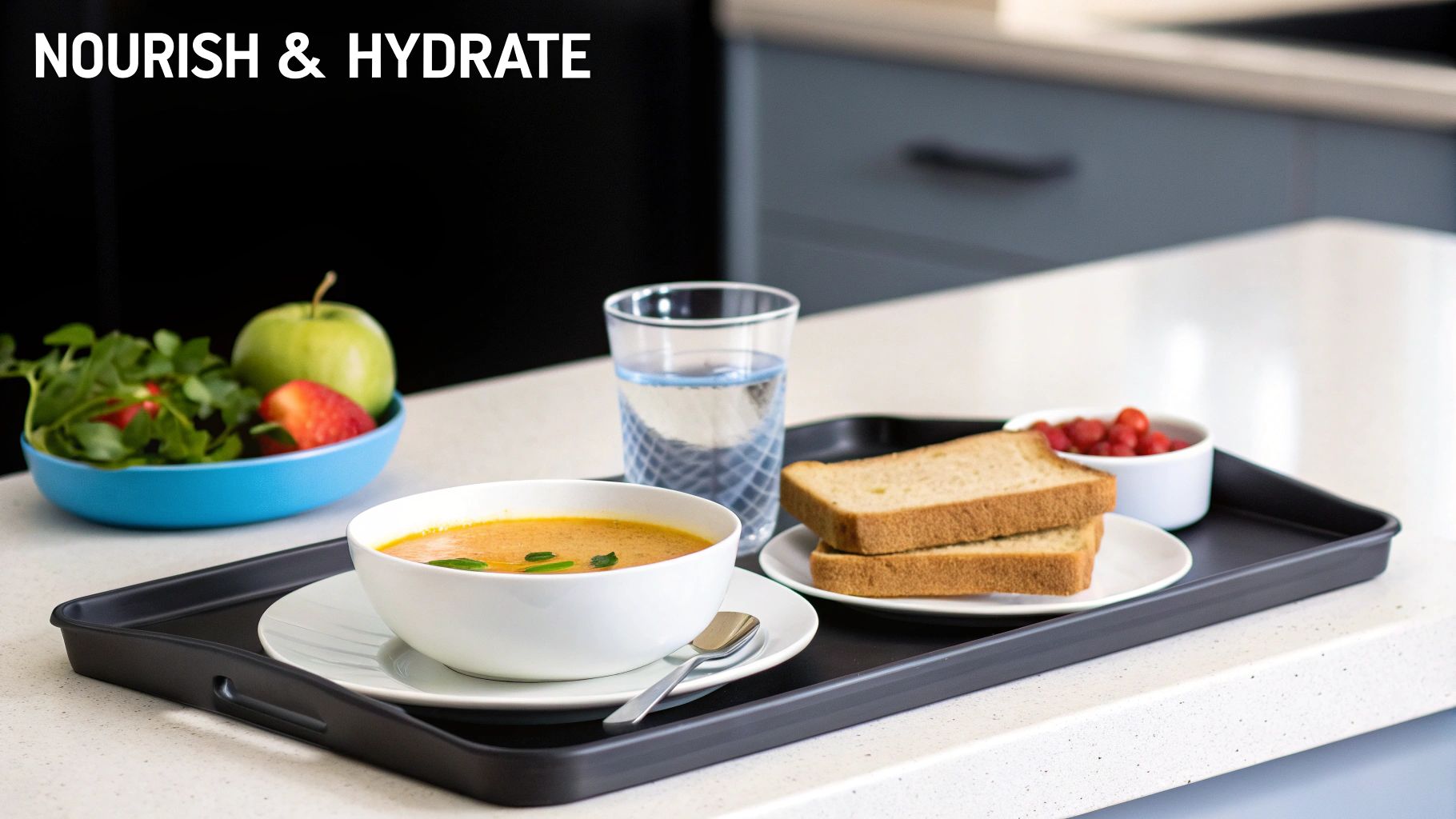
When you're getting ready for chemo, it’s all too easy to get caught up in the medical appointments and prescriptions. But don't overlook the power you have right in your own kitchen. What you eat and drink every day are some of the most important tools you can control.
Good nutrition isn't about some complicated, restrictive diet—it's about giving your body the fuel it needs to stay strong, support your immune system, and recover between treatments. Let's build your nutritional game plan.
Nutrient-Dense Foods to Prioritize
On the days you feel up to it and have a good appetite, think about packing in as much nutrition as you can. Focus on foods that are "nutrient-dense," meaning they give you the most bang for your buck in every bite. These foods are loaded with the vitamins, minerals, and protein your body is crying out for to repair cells and keep fatigue at bay.
Try to build your plate around a balance of lean protein, whole grains, and a rainbow of fruits and vegetables. This combination provides the steady energy you need to get through treatment and supports your body’s healthy cells.
Some great options to stock up on:
- Lean Proteins: Think chicken, fish, eggs, beans, and tofu. These are absolutely essential for maintaining muscle and repairing tissue.
- Healthy Fats: Avocado, nuts, seeds, and olive oil are fantastic for reducing inflammation and giving you a concentrated source of calories when you need them.
- Colorful Produce: Berries, leafy greens like spinach, broccoli, and sweet potatoes are packed with antioxidants that give your immune system a helping hand.
- Whole Grains: Oats, quinoa, and brown rice provide sustained energy from complex carbs and fiber, helping you avoid energy crashes.
Gentle Foods for Difficult Days
Let’s be real: there will be days when your appetite vanishes or you’re dealing with nausea or mouth sores. The last thing you should do is force down a huge, complicated meal. This is when you pivot to simple, bland, and easy-to-digest foods.
The trick is to eat small, frequent meals throughout the day instead of three big ones. This approach can help keep nausea in check while making sure your body is still getting a steady stream of energy.
Forcing yourself to eat when you feel sick can create a really negative mental block around food. Be kind to yourself. On those tough days, the only goal is to get some calories and hydration in, no matter how small it seems.
Here are a few go-to options for those harder days:
- Simple Starches: Crackers, toast, plain pasta, and white rice are incredibly easy on the stomach.
- Soothing Soups: Clear broths, a simple cream of chicken soup, or a pureed vegetable soup can be both hydrating and nourishing.
- Soft Fruits: Bananas, applesauce, and canned peaches are gentle and don't require much chewing.
- Hydrating Drinks: Smoothies, protein shakes, and electrolyte drinks can be absolute lifesavers when solid food just isn't an option.
The Critical Role of Hydration
Of all the things you can do to prepare for chemo, staying hydrated is one of the most important and, frankly, most overlooked. Being dehydrated can make common side effects like fatigue, nausea, and constipation so much worse.
Your body relies on water to flush out the chemotherapy drugs and their byproducts, so you can't afford to fall behind.
Aim for 8-10 glasses of fluid a day, but always listen to your body and follow your care team’s specific advice. Water is best, of course, but other liquids count, too! Herbal tea, broth, and even diluted juices can help make hydration more interesting. My best tip? Keep a water bottle with you at all times—it’s a simple visual cue to sip throughout the day.
Food Safety is Paramount
During chemotherapy, your immune system is working overtime, leaving you more vulnerable to infections. This makes food safety a top priority. A foodborne illness that would be a minor issue for a healthy person could become a serious complication for you.
Get into the habit of washing your hands thoroughly before you handle food. Be meticulous about rinsing fresh fruits and vegetables, always cook meats to their proper internal temperature, and steer clear of raw or undercooked foods like sushi, rare steak, and unpasteurized dairy. These simple habits are a crucial part of your overall care plan.
Managing Work Finances and Daily Logistics
Juggling the practical side of cancer treatment can quickly feel like a full-time job. Beyond the medical appointments, there's a whole world of financial and logistical hurdles to navigate. Trust me, tackling these details head-on will significantly reduce your stress, letting you focus your energy where it matters most: on your health.
The first step? Get organized. It sounds simple, but it makes a world of difference. Create a dedicated folder—physical or digital—for all your medical paperwork. This is where you’ll keep insurance cards, hospital bills, lab invoices, and those confusing Explanation of Benefits (EOB) statements. Having it all in one spot will be a lifesaver when you need to track an expense or follow up on a claim.
Navigating Your Financial Health
First things first, you need to understand your health insurance policy inside and out. Call your provider and ask specifically about your coverage for chemotherapy, related medications, and lab work. Pin down the exact numbers for your deductible, copayments, and out-of-pocket maximum. Don't be shy about asking for a dedicated case manager—they can become an invaluable point of contact.
You’ll soon discover that medical bills can be incredibly complex. It’s common to receive separate invoices from your oncologist, the infusion center, the pharmacy, and the lab that runs your blood work. Always ask for an itemized bill. It helps you see exactly what you're being charged for, and if something looks off, you can call the billing department to have it reviewed.
Your hospital’s social work or financial navigation department is one of your most valuable resources. They are experts at finding assistance programs, from co-pay relief funds to grants that help with everyday living expenses. You are not the first person to face these challenges, and they are there to help.
The financial impact of treatment is no small thing. To give you some perspective, the global market for chemotherapy drugs was valued at around USD 157.7 billion in 2022 and is projected to more than double by 2032. This reflects the reality of new, advanced—and often expensive—therapies, which just highlights why financial planning is so critical. You can learn more about these chemotherapy market trends if you're interested in the data.
Working Through Treatment
Deciding whether to continue working during chemotherapy is a deeply personal choice. The best approach is to have an open conversation with your employer as early as you feel comfortable. You don't have to disclose your specific diagnosis, but you should discuss the potential need for a more flexible schedule or time off for appointments and recovery days.
It’s also wise to get familiar with your rights under the Family and Medical Leave Act (FMLA), which may allow you to take unpaid, job-protected leave. Your HR department is the best place to get the necessary paperwork and learn about company-specific policies, like short-term disability insurance.
Arranging Your Daily Logistics
Beyond the big-picture items like finances and work, the small, day-to-day logistics require a solid plan. There will be days, especially right after an infusion, when you won’t feel well enough to drive yourself to and from appointments.
Here’s a quick-start plan:
- Transportation: Line up your drivers. Ask friends or family if they can create a rotating schedule to help with rides. Also, look into services like the American Cancer Society's Road To Recovery program.
- Childcare and Pet Care: If you have children or pets, now is the time to arrange for backup care. Let your support network know the specific dates you anticipate needing an extra hand.
- Household Help: People want to help, but they often don't know how. Don't be afraid to accept their offers. Create a shareable list of specific tasks—like picking up groceries, preparing a meal, or doing a load of laundry—so people know exactly what you need.
Getting these practical elements organized is a powerful act of self-care. It clears the mental clutter, giving you the space you need to face your treatment with a little more peace of mind.
Building Your Emotional and Social Support System
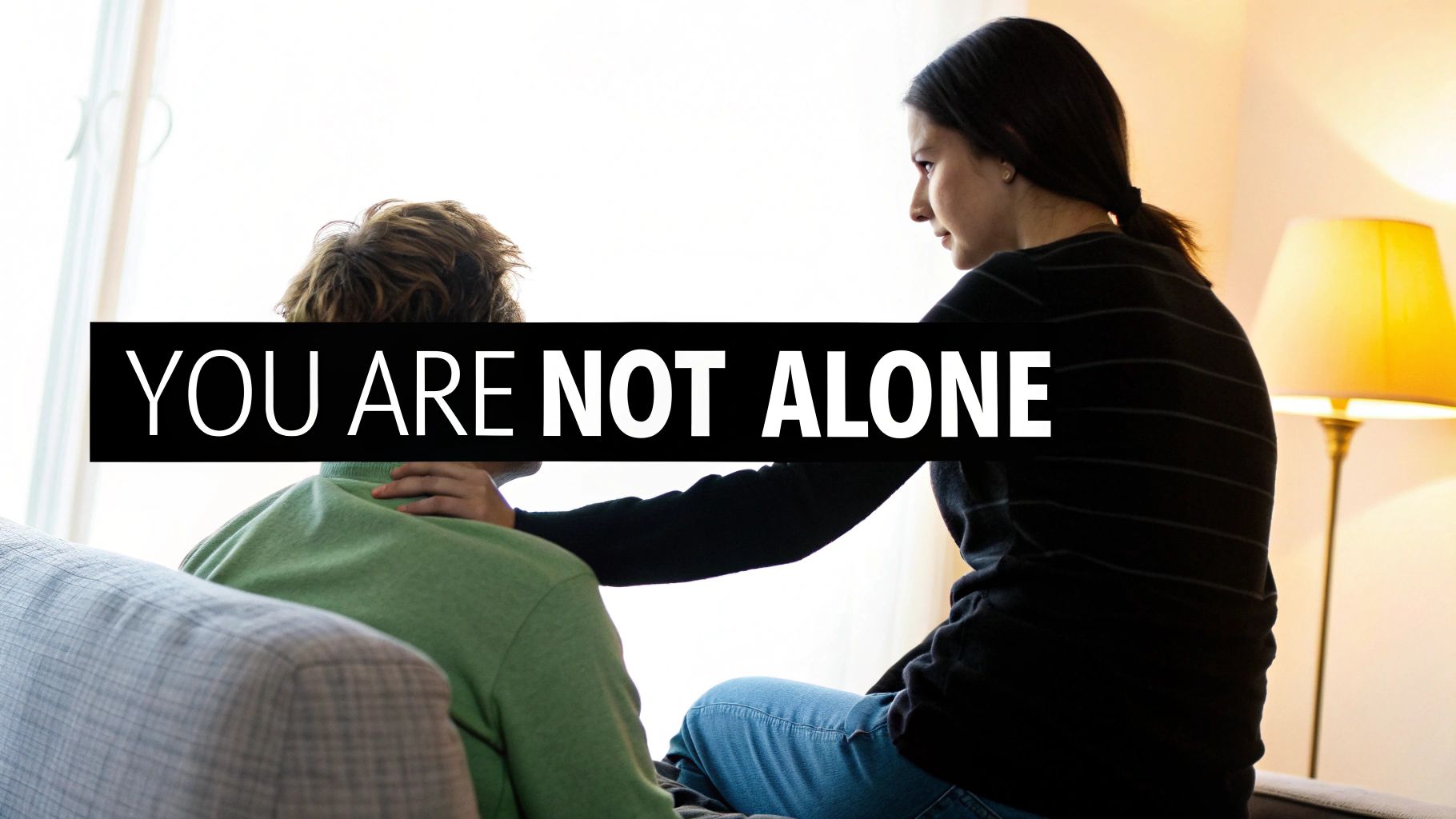
Getting ready for chemo isn't just about blood tests and medication schedules. Your emotional well-being is a massive part of this equation, and frankly, it's what will carry you through the toughest days.
Having a solid support system is one of the most powerful resources at your disposal. But for many of us, it’s also the hardest thing to ask for. Please remember, you are not meant to do this alone. Letting people in—family, friends, a therapist—is a sign of incredible strength.
Letting People Help (and Telling Them How)
Here’s something I’ve seen time and time again: your loved ones are desperate to help, but they have no idea what to do. They're scared of saying or doing the wrong thing.
The best thing you can do is be direct. A vague "I'm having a rough day" is tough to respond to. But a specific, "Could you possibly pick up some ginger ale and crackers on your way home?" is a task someone can easily and happily accomplish.
It feels vulnerable at first, but practice accepting help. When someone asks, "What can I do?" have a few small, concrete tasks in mind. This makes it easy for them to step up and genuinely lightens your load.
When someone you love is sick, you can feel completely helpless. Giving friends and family a specific job—like walking the dog, grabbing your groceries, or just sitting with you to watch a movie—is a gift to them, too. It gives them a tangible way to show they care.
Choosing Your Point Person
While having a village is fantastic, it's also smart to designate one or two people as your primary support partners—your "chemo buddies." This is your go-to person who can help you manage the flood of information and logistics.
Think of them in a few key roles:
- A Second Set of Ears: They come to appointments to take notes, help you remember your questions, and debrief with you afterward. You'd be surprised what you miss when you're feeling overwhelmed.
- The Information Hub: Instead of you having to repeat difficult updates 15 times, your point person can send out a group text or email to keep everyone in the loop. This saves an enormous amount of emotional energy.
- The Practical Partner: This is the person you call for a ride to the infusion center or for help when you're just feeling too wiped out to function.
Look for someone who is calm under pressure, a good listener, and reasonably organized. For those taking on this crucial role, learning how to support someone with cancer can provide them with invaluable guidance.
Taking Care of Your Head and Your Heart
The emotional weight of a cancer diagnosis is heavy. It's not something you can just ignore. Your mental health is just as important as your physical health right now; in fact, they're completely intertwined.
It's absolutely essential to find healthy ways to process everything you're feeling. Start thinking about what might work for you before you're in the thick of it.
- Journaling: You don’t have to be a great writer. Just getting the thoughts, fears, and frustrations out of your head and onto paper can be incredibly freeing.
- Mindfulness & Meditation: Even 5-10 minutes of quiet can make a difference. Apps like Calm or Headspace offer guided sessions specifically for managing anxiety and stress.
- Finding Your People: Connecting with others who just get it is powerful. Ask your nurse navigator or hospital social worker about support groups, either in-person or online.
- Talking to a Pro: There is zero shame in seeking professional help. Oncology social workers and therapists who specialize in supporting cancer patients can give you real, practical coping strategies in a safe, confidential space.
Building this emotional toolkit now means you’ll have what you need to lean on when treatment gets tough.
Answering Your Top Questions Before Starting Chemo
As your first treatment day gets closer, you're bound to have a lot of practical questions swirling in your head. That's completely normal. Getting straight answers is one of the best ways to quiet the anxiety and feel more in control.
Let's walk through some of the most common things patients ask.
What Should I Actually Pack for Infusion Day?
Think of your chemo bag as your personal comfort toolkit. Infusion sessions can be long, sometimes lasting for hours, and having the right things with you can make a world of difference.
Here’s a quick checklist of what I've seen make patients most comfortable:
- For Coziness: Infusion centers are often kept quite cool. A soft blanket, a cozy shawl or sweatshirt, and a pair of warm, fuzzy socks are must-haves. A neck pillow can also be a lifesaver for napping.
- For Snacking: It's smart to bring a water bottle to stay hydrated, along with some simple, bland snacks. Think crackers, pretzels, or a plain granola bar—things that are easy on the stomach.
- For Distraction: Time can crawl by, so bring something to keep your mind occupied. A good book, a tablet loaded with movies, or headphones for music or podcasts are all great options. And don't forget your chargers and a portable power bank!
- For You: Lip balm is a non-negotiable for dry lips, and an unscented lotion is great for your hands. I also recommend a small notebook and pen to jot down any thoughts or questions that come up during your session.
Can I Still Take My Daily Vitamins or Supplements?
This is a big one, and it's something you absolutely must discuss with your oncologist. Please don't assume that just because something is "natural" or over-the-counter, it's safe to take during chemotherapy.
Many common vitamins, herbs, and supplements can actually interfere with how your chemotherapy drugs work. Some can make the treatment less effective, while others can unexpectedly increase your side effects.
Before your first infusion, make a detailed list of everything you take—from multivitamins to herbal teas to occasional pain relievers, including the dosages. Your oncology team needs this complete picture to keep you safe.
How Do I Handle My Job and Work Schedule?
This is a deeply personal decision, and there's no one-size-fits-all answer. It really depends on the type of work you do, the flexibility of your job, and most importantly, how you feel.
Many people find they can continue working, but they often need to make some adjustments. The best approach is to talk to your manager or HR department proactively. You might discuss the possibility of a flexible schedule, working from home on days you feel fatigued, or shifting your hours. Honesty upfront can make the process much smoother.
What Are the Red Flags I Should Watch for?
Your oncology team will give you very specific instructions about what to look out for, but there are a few universal warning signs that mean you need to call them right away, no matter the time of day.
Get in touch with your care team immediately if you experience:
- A fever of 100.4°F (38°C) or higher
- Nausea, vomiting, or diarrhea that you can't get under control with your prescribed medications
- Sudden shortness of breath or chest pain
- Any signs of an allergic reaction, like hives, a rash, or swelling of your face or throat
Knowing what to pack and what to watch for helps you step into this next phase with more confidence. For a deeper dive, check out these other common questions and resources about cancer treatment.
At Hirschfeld Oncology, we know that being well-informed is key to feeling empowered. If you’re looking for a compassionate, experienced team to guide you through treatment with truly personalized care, request a consultation at https://honcology.com/blog.





.png)


.png)
.png)


